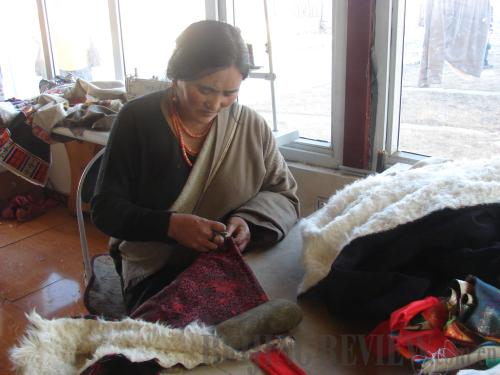|
 |
|
PINS AND NEEDLES: Konchuja's wife sews a Tibetan robe in their new house in Tanggor Township in Zoige County, Sichuan Province, on December 7, 2012 (BAI SHI) |
For hundreds of years, Tibetan herdsmen and their families on the remote plateaus of southwest China's Sichuan Province have led traditional nomadic lives. In winter, the freezing cold weather of the highlands makes each day a challenge.
According to the latest census, about 111,600 Tibetan herder households, roughly 533,000 people, reside in grasslands throughout Sichuan, mostly in shabby camps.
In October 2008, the Sichuan Provincial Government initiated a housing program to improve the livelihood of nomads. Accordingly, construction would include 1,409 settlements in 29 pastoral areas over four years, providing new houses to families with no permanent dwelling. Completion of the project is believed to advance overall provincial development.
In Meruma Township in Aba County, located in the northern part of Aba Tibetan and Qiang Autonomous Prefecture, the newly constructed settlement is conveniently located near a major road to Chengdu, the provincial capital.
Within the small township, houses are well arranged. Every family has a separate courtyard combining Tibetan architecture and modern functionality. A stream provides an attractive natural backdrop for comprehensive infrastructure in a region where roads, plumbing, refuse storage and telecommunications are relative luxuries.
According to Mayor Chime Dorsheng, Meruma has five villages with a total of 4,888 residents, all making a living raising livestock.
"After moving into new houses, our lives are much better," Chime Dorsheng said. "Elders, women and children live in warm and comfortable facilities. Young herdsmen carry out pastoral work in grasslands via motorcycle. When it gets dark in winter, those who work outside can return home quickly for supper."
The housing program also provides more public services to local residents. "Our township has everything we need. For example, elders can see a doctor in the local clinic and children also can go to school nearby," Chime Dorsheng said.
In addition, there are several outdoor basketball courts and other recreational facilities where youngsters often play, despite the cold.
"There was no such sports facilities before. Playing games keep our kids healthy and help knit tight bonds," Chime Dorsheng said.
According to local officials, the government has made great strides since implementing the housing program in February 2009, making sure settlements are located near principal roads, pastures, as well as city and township seats. Thus, residents are provided with convenient transport, safe water supplies and sound public services while protected from possible natural disasters.
Konchuja, 44, lives in a new house with his wife, two daughters and mother in newly built Fenjia Village in Tanggor Township, Zoige County.
The family moved into the house in 2010. His courtyard covers an area of over 200 square meters. "Our new home cost 120,000 yuan ($19,256) in total. The government offered me a subsidy of 20,000 yuan ($3,209) while I took out a low-interest loan of 30,000 yuan ($4,814)," he explained.
The cost distribution of Konchuja's new house accords with the nomad housing program. That is to say, funds are derived from government aid, bank loans and self-financing.
"Compared to the past, life has changed a lot. We used to live side-by-side with our yak herds. Our camps were small, flimsy and cold. Now we live in a new house with clean water and electricity. We have a TV and a telephone. Moreover, we are near the township seat, which makes it convenient for my younger daughter to attend school," he said.
Konchuja has left the life of a herdsman. "I rent out my rangeland for 40,000 yuan ($6,419) a year."
Due to its scenic grasslands and traditional lifestyles, tourism has boomed in Tanggor. In summer, Konchuja runs a five-bed family inn where he charges backpackers 50 yuan ($8) a night.
| 